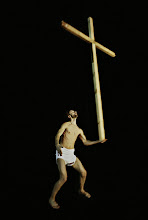.jpg)
Jan Fabre
Royal Festival Hall
15 and 16 April.
In a world where everything is tolerated, how do you know what it means? If we agree that taste is relative, then what’s the point discussing taste at all? If consumerism doesn’t have a moral or ethical cloak – you don’t need to consume for any other reason – then why will having things make you happy?
In a world like this, mightn’t the journey of life just as well be a round of competitive masturbation – an exercise in ostentatious self pleasuring, the rivalry of which stops it being pleasurable at all?
If there is no moral compass, in other words, the drive for personal fulfilment has no context, and no prize.
Welcome, to the Orgy of Tolerance.
Jan Fabre’s production really does begin with a round of competitive masturbation, in which two men and two women try to orgasm to the vicious encouragement of a team of military coaches. It is the woman who loses, lying shivering and unfulfilled at the front of the stage, who introduces the rest of the show - she is ‘very excited’ [to welcome us to the show] she tells us, although she is crying with the frustration of not being able to come. Unable to amuse herself like the other contestants, this loser sets the scene for an indictment of contemporary culture, consumerism and the liberals who pretend they don’t take part.
In a collection of scenes that dissolve into each other like photos in a digital picture frame, Orgy of Tolerance tweaks the small things in otherwise recognisable scenarios. A group of people takes an exercise class – to exercise money. Three pregnant women give birth – to supermarket goods. The result is a grotesque image of modern values, obsessed with the inexplicable pursuit of inexplicable things. In one scene a woman has sex with a sofa, with the help of two leering and excited men. It is hard to think of an object that is less erotic, less able to resemble a human, less an object of desire than a sofa. And yet here in the UK, furniture giant DFS is having its famous sale again every weekend, so there must be something attractive about spending hundreds of pounds on a leather three-seater.
This complacency of desire in Fabre’s play is neither a solution to unhappiness, nor a useful tonic for it. Early on, Jesus makes an entrance. Bearing his cross on the way to dying for man’s sins, he is immediately spotted and styled by a camp fashion director, and his cross is removed. Instead of relieving Jesus of his burden, however, this propels him to spend the rest of the play wandering on and off stage, balancing an imaginary cross like a deluded circus performer. Later, couples wander on stage and start to pick out parts of the set to buy for their living rooms, but they can’t get their fix from consumerism alone: they also need a good snorting of cocaine to help them on their way. And what of the men who are fellated by silent, stiletto-wearing slaves as they discuss their ‘trophies’ from human hunts? Nodding sagely at each other’s racist jokes, they slide imperceptibly into barking madness – one of them sticks his rifle up his arse and yelps like a rabid dog.
The irony of Orgy of Tolerance is that one of the ways it fulfils its title by trying to be as offensive as possible. At one stage all the actors line up and shout ‘Fuck You!’ at every social group imaginable. Personally, the moment I got offended was when a woman wearing a Klu Klux Klan outfit started moonwalking to the sound of The Beatles' 'Come Together'. What was this collection of cultural references doing together in a visual trick? And when did it become ok to impersonate the KKK?
The point, of course, is that it’s not ok. It is also not ok to turn the famous images of torture at Abu Ghraib into jokes for an audience to smirk at in the Queen Elizabeth Hall. It is by being so relentlessly offensive that Fabre hopes to make his point – moral relativism can only go so far; you need to have a sense of right and wrong before anything can make sense at all. An Orgy of Tolerance, the play suggests, is a degraded and putrid place, where meaning is squeezed out of the vacuum packaging of consumer goods. Tolerance, paradoxically, is only feasible if the rest of the world is tolerable. The problem the play sets itself is: how do you make this point without simulating the Orgy?
Mary Paterson is Co-director of Open Dialogues mary@opendialogues.com

.jpg)
No comments:
Post a Comment